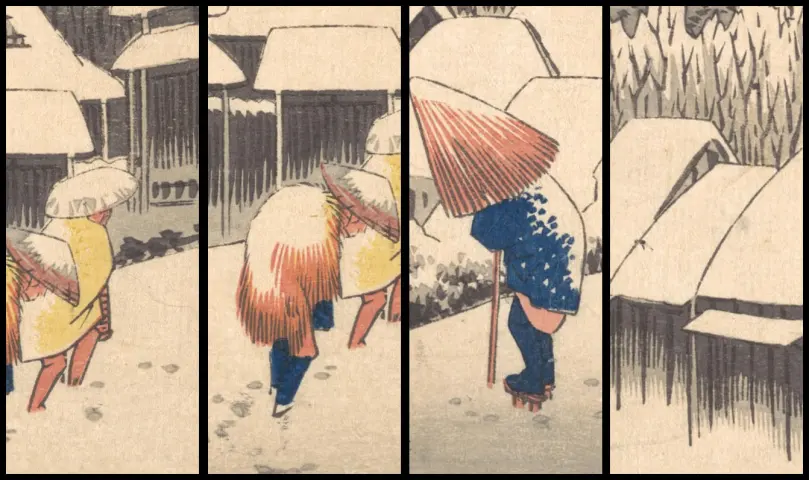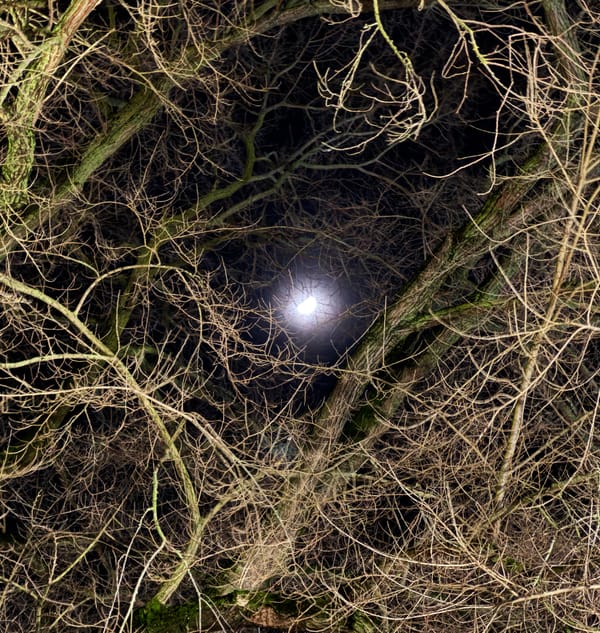2021iii5, Friday: look closer.
Why taking the time to let the details sink in is critical to good advocacy. And a confession about football.

Short thought: My love of ukiyo-e (woodblock printing) is no secret. But I never thought it would help me think about my advocacy.
The trigger here is a piece from Craig Mod, about whom I’ve written in the past, entitled “Looking Closely is Everything”. Craig starts by discussing a famous Hiroshige print, comparing his own capsule description of it to a previous writer’s much more detailed one. He describes the thought-paths that spin off the in-depth word picture, and uses them to draw a lesson:
The point being: Looking closely is valuable at every scale. From looking closely at a sentence, a photograph, a building, a government. It scales and it cascades — one cognizant detail begets another and then another. Suddenly you’ve traveled very far from that first little: Huh.
I’d say that that huh is the foundational block of curiosity. To get good at the huh is to get good at both paying attention and nurturing compassion; if you don’t notice, you can’t give a shit. But the huh is only half the equation. You gotta go huh, alright — the “alright,” the follow-up, the openness to what comes next is where the cascade lives. It’s the sometimes-sardonic, sometimes-optimistic engine driving the next huh and so on and so forth.
“Huh”. I agree with this. That moment where the meaning, the import, of something changes. Fundamentally. It can be an almost physical sensation. And you see anew as a result.
This is the advocacy significance, I think. When you’re faced with a bundle - 600 pages for a case tomorrow morning - the temptation to speed-read is overwhelming. And necessary: it just isn’t possible to spend too long with any one page. But you have to spend enough time; enough so that you understand where each page fits into the big picture, and so that - as the narrative evolves through your reading and consideration - your sense of the shape of the documents is sufficient to bring you back to a critical detail on page 332 (or wherever) whose significance will change if you can take the time, in the context of fresh understanding, to look closely at it.
There’s an analogy with one of Edmund King’s rules on how to lose a case (yes, I know - but it really is worth coming back to). Rule 8 tells you not to prepare cross-examination on your own. If you’ve time, and you have a team, read the whole thing individually - then read each page together, and talk about it. Truths and implications will emerge far more clearly.
Similarly, looking closely is akin to enjoying the small things. It’s all about the trees, as well as the wood - each complementing the other, and each deserving attention and care. Even love.
Whenever I lose cases (at least, those which had a decent run in the first place), often it’s because either I haven’t put myself properly in the shoes of the opposition, or there’s some detail whose significance has escaped me. I’ll be trying to look more closely. Thanks, Craig.
Something beautiful: Cephalopods are cool. They just are. As I've written before, there are those who see octopuses in particular as something akin to sentient, and I wouldn't disagree.
So this picture is both gorgeous and somehow unsurprising. An underwater photographer left his camera in a rock pool - and its resident decided to have a play with it. With fabulous results. Enjoy.
Someone is right on the internet: Anyone who knows me knows that I’m not so much allergic to team sports as largely indifferent. Basketball’s the only one I’ve ever really enjoyed playing (very badly, but there you go); and I’ve occasionally watched live cricket with an appreciation as much of the occasion and the rhythm as of the sporting action itself.
(I’m a twin, and this was a source of unending frustration for my sporting brother when we were kids. The universe had given him a sibling of precisely the right age as a permanent playing partner - and made him a sports-hater. Thanks, universe.)
Football’s different. My feelings go beyond indifference and into active dislike - not so much for the sport itself, which is fine, but for the English expectation that everyone - at least, every male - is going to be into it. I’ve got no problem with those who love and live and breathe football. I have a huge problem when I’m sometimes classed as weird (or even antisocial) because I don’t.
This may of course be my age. I grew up in the days when a good deal of English football was primarily about muscularity rather than grace, or so it seemed to me. And Route One summarised all that was worst about it: the idea that booting the ball up the pitch was the only really English way to play.
I always wondered why (aside from the insane idea that finesse was somehow un-English) Route One came into being. I’ve seen the idea that heavy old-fashioned balls meant passing was too tiring. Well, maybe. But this piece on Fivethirtyeight (via FT Alphaville), about an early sports statistician called Charles Reep, rather appealed as an alternative explanation:
It probably wasn’t entirely Reep’s fault when England flamed out at Euro 1992, or when they failed to qualify for the 1994 World Cup. But it couldn’t have helped that they were playing a misguided style, informed by well-meaning but faulty statistical principles.
To find out where Reep went wrong - which is a lovely example of getting causation the wrong way round - read the piece. Not at all sure it stands up as an explanation of Route One, but it appeals nonetheless.



